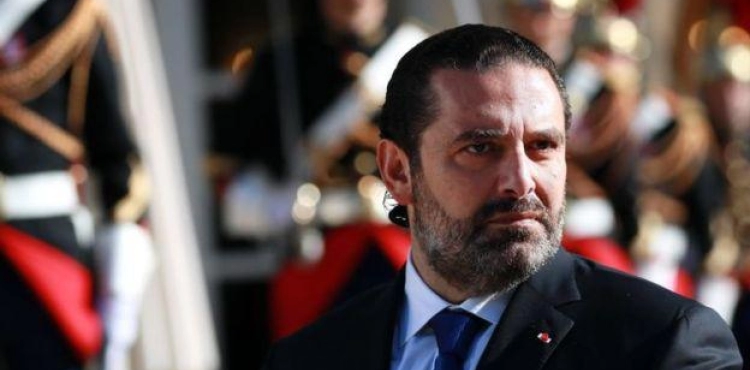Lebanese Prime Minister Saad al-Hariri announced on Tuesday the resignation of his government after 13 days of unprecedented popular protests across the country to demand the departure of the entire political class.
Demonstrators in the squares and streets received news of Hariri´s resignation by welcoming and cheering to celebrate what their popular movement, which began on 17 October, had brought about complete paralysis in the country.
Hariri said in a brief speech in Beirut, "I will go to the Baabda Palace to present the resignation of the government" to President Michel Aoun and the Lebanese people, "in response to the will of many Lebanese who took to the streets to demand change."
"It has reached a dead end and it has become necessary to be very shocked to face the crisis."
The streets and squares of Beirut and many areas from north to south are crowded with demonstrators who cut off key roads in a cross-sectarian movement that shut down banks, schools and universities to demand the overthrow of the entire political class.
Hariri, 49, said: "Positions go and come, what is important is the dignity and integrity of the country."
The current government is Hariri´s third government since he came to power in 2009.
Hariri appealed to the Lebanese "at this historic moment," asking them "to present Lebanon´s interest and the safety of Lebanon, protect civil peace and prevent economic deterioration over anything else."
After Hariri ended his speech, the president´s Twitter account said that Hariri had submitted his resignation letter to President Aoun at the presidential palace and said he was "convinced of the need to create a positive shock and create a government capable of meeting challenges" before leaving without making any statement.
The director of the Mashriq Institute for Strategic Affairs, Sami Nader, told AFP that Hariri "opens the door to a solution because resignation is the only way to get out properly from the current crisis."
Interior Minister Raya al-Hassan, a member of Hariri´s Future Movement, said in a tweet late Tuesday that Hariri´s resignation was "necessary to prevent the slide towards civil strife that we have seen today in downtown Beirut," referring to the violence.
Dozens of Hezbollah and Amal supporters attacked with sticks and stones the site of the main gathering of demonstrators in downtown Beirut. They tore up and burned tents set up by protesters in the Riad el Solh and Martyrs squares and attacked a number of protesters at the scene.
As part of the internal reactions, the head of the Lebanese Forces party, Samir Geagea, whose ministers resigned on the first day of the movement, praised Hariri´s move, noting that what is currently important is "the formation of a new government of specialists known for their cleanliness." About political forces. "
MP Sami Gemayel, head of the only Phalange Party in the government, described Hariri´s decision as a "historic decision in a historical circumstance", noting that "this is the beginning of the path of change." He called for "the formation of a government specialists and early elections."
On the external front, French Foreign Minister Jean-Yves Le Drian said that Hariri´s announcement of his resignation "exacerbates the crisis." He asked in a statement: "Will (Lebanese leaders) put the public interest in front of their own interests? This is a question posed by Prime Minister (Saad) Hariri´s decision to withdraw."
Bassel Salloukh, a professor of political science at the Lebanese American University, said the resignation was "an opportunity for the sectarian political elite to retreat from the brink."
Earlier last week, Hariri announced a paper on economic reforms in an attempt to absorb the anger of the street. Lebanese President Michel Aoun called in a speech to reconsider the government´s reality. But the demonstrators considered that the reform paper came late and did not meet their ambitions and continued to cut off roads and demand the departure of all components of the political class.
Some of the protesters who listened to Hariri´s speech directly from the streets fired firecrackers and sang the national anthem in celebration.
"The resignation of the government is a good thing, but we must move on to the next step, which is the formation of a small, independent and transparent government ... to take the necessary transitional measures," Jill Samaha of Riad El Solh Square told AFP.
In Sidon, Hariri´s hometown, protesters dabka danced in the streets while others were distributing sweets and juice to protesters, in a symbolic event in a city where Hariri enjoyed great popularity.
"We are very happy," said Ahed al-Madi, a demonstrator in Sidon. "It is from the heart of the anger of the people."
He stressed, "We will not get out of the street our goal is not only to overthrow the government, but to achieve the demands that brought us to the street," the most important economic demands.
In Tripoli in the north, a predominantly Sunni city where Hariri is popular, protesters also celebrated his resignation.
"Hariri´s resignation is required but not enough," said Tema Samir, 35, a mother of two. "It´s part of the people´s demands to change the whole system."
Lebanon´s ruling class consists mostly of leaders who were part of the country´s devastating civil war (1975-1990), most of which have been in power for nearly three decades. They generally represent a particular sect or region.












